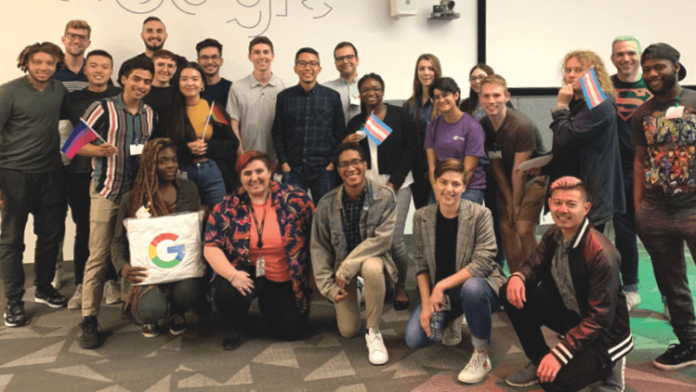
When starting a career, mentorship is one of the most valuable resources. Regardless of the discipline, there’s nothing quite like having an experienced person who walked the same path offer help and guidance. That can be especially true in a field as exclusive and competitive as tech — and for people as marginalized as members of the LGBTQ+ community.
That’s where Out in Tech comes in.
Out in Tech is a nonprofit network of over 40,000 members with the goal of helping LGBTQ+ people advance in their careers and using technology to advocate for social change. The group also hosts one of the world’s most comprehensive youth mentorship programs — Out in Tech U — for queer and trans youth interested in breaking into the world of technology.
“We started the program to build the confidence and credentials of queer and trans youth. We know they’re ‘technically amazing’ (get the double entendre?) and we think it’s important that they know it too,” says Gary Goldman, senior program director for Out in Tech. Every year, 300 students (ages 17 to 24) from around the country participate in the program.
“There is still severe underrepresentation of LGBTQ+ folks in tech leadership roles, especially queer and trans people of color,” Goldman continues. “Visibility and representation are critical in the workplace, and the mentorship program enables queer youth to develop technical skills, grow their professional networks, and learn how to navigate sexual orientation and gender identity in the workplace from successful LGBTQ+ techies already doing it. In fact, our mentors repeatedly tell us they wish this program was around when they were just learning the ropes.
Out in Tech U first launched in 2015 as a résumé writing workshop, which paired 30 LGBTQ+ students with 30 mentors who helped them craft the perfect CV and LinkedIn profile. It started really coming together in 2017 with a small class of 15 New York City-based tech hopefuls trying to make their way in the workforce. Fast-forward to present day. The program now runs all year long, divided into seasons (the fall 2021 cohort just started their eight-week mentorship program this September), and mentees can now be based virtually anywhere. After gaining acceptance into the program, each mentee is connected to a current Out in Tech member whose career and trajectory match their interests.
“Mentors serve as a professional and emotional anchor for their mentees, enabling them to refine the directions of their careers,” Goldman says. “For the duration of the eight-week program, mentors meet with their mentees for two hours weekly to develop functional and career-oriented skills for a future in tech. Half of the time is spent developing technical skills and working on a final project, and the rest is spent working on career development: nailing your job interview, improving your résumé, discussing how to find a queer-friendly employer.”
And when it comes to employment, Goldman affirms that within the technology space, there is a diverse selection of career paths to follow.
“Not all mentees are interested in becoming software engineers or developers,” he says. “Some are interested in product design, product management, data science, sales, and marketing. The tech industry encompasses a wide range of roles and skills, and we welcome interest in all job functions into our program.”
While for young LGBTQ+ folks, looking for opportunities in a field that is often seen as elitist can feel daunting, Goldman assures that although there is still a lot of work that needs to be done, the industry has made great strides in inclusion in recent years.
“We’ve come a long way in the past decades,” Goldman says. “As of 2020, for example, U.S. businesses cannot fire employees based on their sexual orientation or gender identity. Most large tech companies have entire departments dedicated to equity and inclusion, have clear nondiscrimination policies, and have LGBTQ+ employee resource groups that catalyze internal advocacy and community.”
“That said, there is still a dearth of data on LGBTQ+ people in tech,” he adds. “We do know that there are still too few queer and trans folks in the executive ranks of tech companies; only three CEOs of Fortune 500 companies are openly gay. Many of our members still experience microaggressions in the workplace, ranging from derogatory language being used towards them, their pronouns not being respected, or being asked to bear the burden of educating their colleagues on all things related to queerness without compensation. The job-seeking experience is even more burdensome for LGBTQ+ people who may need transgender-inclusive health care plans, which employers may or may not accommodate.”
For positive change to happen, people who belong to marginalized communities must be elevated to positions of power. But that requires getting a foot in the door. “The best way to hire queer people, Black people, Latinx people, disabled folks — is to hire them!” Goldman says. “We believe that when LGBTQ+ people inhabit positions of leadership in tech, this will lead to more equitable and inclusive cultures and safer workplaces for all underrepresented and underestimated groups. If they don’t experience a culture of inclusion and belonging once there, they’re much more likely move on to roles at other companies where that exists. In our experience, companies that measure employee engagement and satisfaction, emphasize the importance of allyship, and have a CEO who sets an inclusive tone are more likely to be welcoming places to work.”
And Out in Tech U’s graduates are helping to ensure more places become welcoming to LGBTQ+ folks.
“We always hope that all mentees walk away from the program feeling more confident about their career path, with a keener understanding of the scope of careers available in tech, what they should expect from an employer, and hopefully a lifelong mentor and friend,” Goldman says. Many Out in Tech U graduates go on to do great things in the tech space, he adds, citing examples like a program that educates about preferred pronouns and a video game about coming out to one’s best friend.
“We’ve seen the majority of our mentees go on to internships and entry-level roles in the tech industry and keep in touch with their mentors. It’s also been exciting to see a few mentees become mentors themselves,” Goldman says. “One of our early mentees got a summer internship through Out in Tech, got hired as a full-time software engineer at one of our partner companies, and then became a mentor and now helps run the program as a volunteer! We’ve also hired half a dozen interns for Out in Tech staff, and they’re some of the most talented individuals we’ve ever had the pleasure of working with.”
“It’s been awesome to witness the caliber of the projects mentees have worked on, coupled with the fact that many of them are centered around creating a safer environment for queer people.”
This story is part of Out‘s 2021 Design issue, which is out on newsstands October 5, 2021. To get your own copy directly, support queer media and subscribe — or download yours for Amazon, Kindle, Nook, or Apple News.
RELATED | Netflix’s Inclusive Benefits Are a Win for LGBTQ+ Employees






